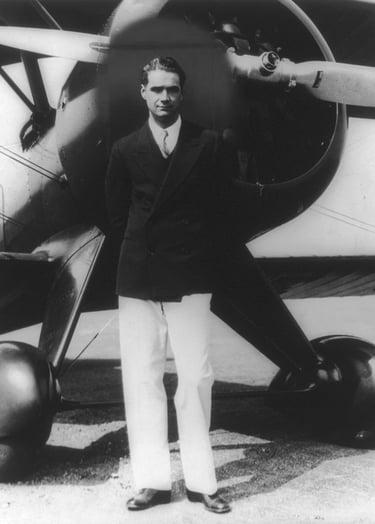When Consumption Comes from Fear: Story of Howard Hughes
While consumption is often associated with pleasure, impulsive purchases and carelessness, sometimes it is rooted it mental health challenges, stress, fear, or other negative emotions. Sometimes does not bring one joy, but barely calms the pain or fear. Famous Howard Hughes is an example of this.
CONSUMERISMMENTAL HEALTHHISTORYFAMOUS PEOPLESUCCESSFUL PEOPLE
Genya
10/31/20242 min read


One of the most unusual stories of peculiar consumption habits belongs to the American businessman and aviator Howard Hughes. Known for his incredible wealth and influence in the entertainment and aviation industries, Hughes's consumption habits were deeply affected by his eccentricities and worsening obsessive-compulsive disorder (OCD). While many wealthy individuals indulged in luxurious goods, Hughes’s spending was fueled by paranoia, germophobia, and an extreme need for control, making his story unique and memorable.
The Story of Howard Hughes’s Peculiar Consumption
In the 1940s and 1950s, Hughes was a household name as a film producer, engineer, and founder of the Hughes Aircraft Company. However, his spending took a bizarre turn as his OCD worsened, leading to increasingly peculiar purchases and extreme behaviors. One example was his obsessive interest in cleanliness. Hughes spent exorbitant amounts of money developing meticulous sanitary practices. He demanded that anyone who served him use tissues, gloves, and detailed protocols, and he often purchased special soaps and toiletries by the crate to satisfy his compulsive cleanliness.
One of Hughes's most infamous purchasing habits involved buying hotels. In the late 1960s, he became paranoid that his enemies were spying on him in Las Vegas, where he was living. To ensure his privacy and control, he bought the entire Desert Inn, the hotel he was staying in, along with several other Las Vegas hotels. This gave him total control over his environment, a rare and extreme form of personal security. He spent millions on renovations, demanding windowless rooms, strictly controlled entry, and employees who adhered to his elaborate guidelines.
Even more peculiar, Hughes was obsessed with banana nut ice cream from Baskin-Robbins. For years, he consumed this particular flavor daily and ordered it in massive quantities. However, when Baskin-Robbins eventually discontinued it, he ordered thousands of gallons to be stored for future consumption. Yet, shortly after receiving this bulk order, he lost interest in the flavor and switched to another, leaving the warehouses stocked with untouched ice cream.
In his later years, Hughes’s lifestyle became a kind of self-imposed prison. He hoarded expensive items, kept all his possessions in sealed rooms, and continued his reclusive lifestyle in dark, isolated penthouses. Despite his wealth, Hughes's unusual consumption habits contributed to his isolation and a reputation for eccentricity. Rather than spending to enjoy life, he spent to avoid fears, resulting in a life filled with luxury items but devoid of joy.
Legacy of Hughes’s Consumption
Howard Hughes’s unusual spending habits illustrate how extreme wealth can amplify mental health challenges, especially when driven by deep-seated fears or compulsions. His story serves as a reminder that material wealth, without balance and well-being, can become a tool for entrapment rather than freedom. Hughes remains a lasting example of how peculiar consumption, in extreme cases, can become a reflection of inner struggles and fears.
